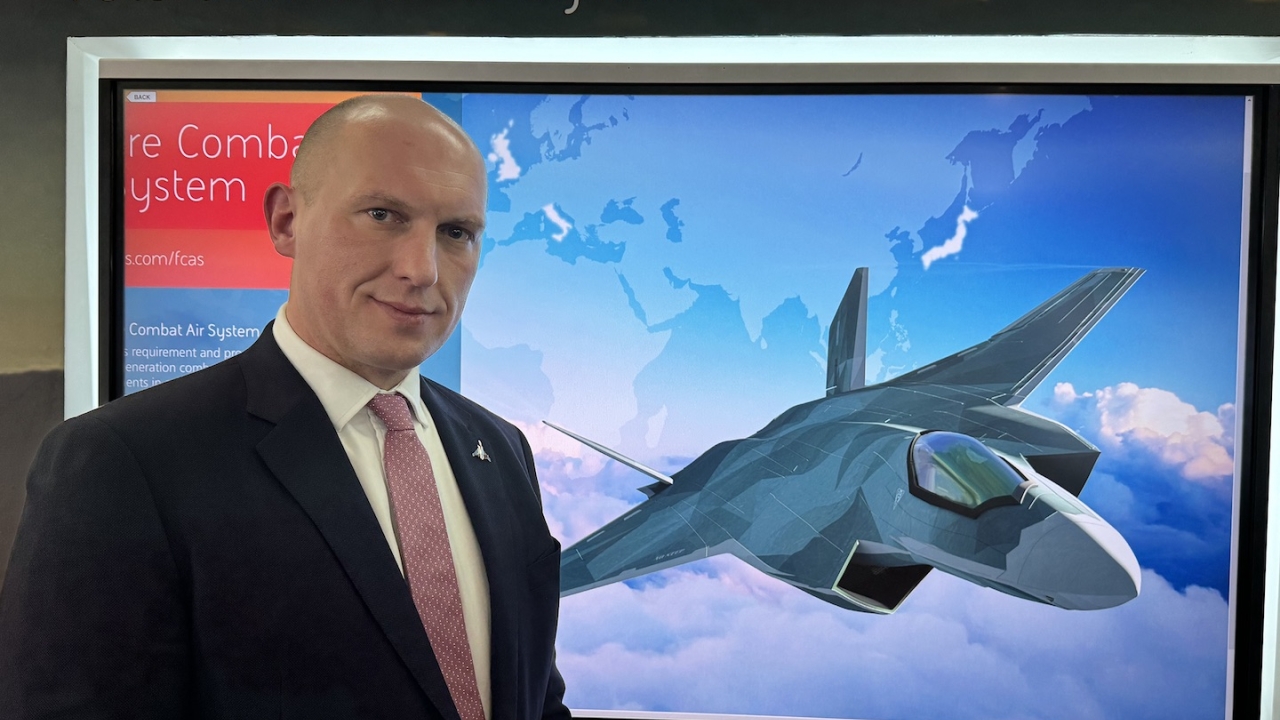What style of CAP is fit for the Kingdom?
Saudi Arabia’s sixth generation fighter plans: Does Korea's KF-21 pose a threat to FCAP?

John Stocker, BAE Systems Business Development Director for FCAS. PICTURE: Jon Lake
Even as the long-standing Royal Saudi Air Force ‘Future Fighter’ requirement is under way, with a contest between the Eurofighter Typhoon (thought to be the favourite), the Boeing F-15EX, and Dassault Rafale, Saudi Arabia is also looking further ahead to its next generation ‘combat air’ requirements.
With the US unwilling to supply even the ‘fifth generation’ F-35A, there would seem to be little prospect of Saudi Arabia being allowed to acquire the even more advanced ‘sixth generation’ NGAD fighter.
That leaves the Kingdom with two sixth generation fighter options – the Franco-German-Spanish SCAF and the Anglo-Japanese-Italian GCAP, with the latter representing a collection of more familiar partners, including long-term partner BAE Systems.
Anglo-Saudi co-operation in combat air has always been organised on a Government-to-Government basis, and Saudi Arabia and the UK are known to have been looking at how they might collaborate on future combat air requirements for some years.
“Combat air plays a really important part of the strategic UK-Saudi Arabian relationship as a whole,” explained John Stocker, BAE Systems business development director for FCAS.
On March 1, 2023 His Royal Highness Prince Khalid bin Salman, Saudi Arabia’s minister of defence, announced that he and UK defence secretary Ben Wallace had signed a declaration of intent under which the Kingdom would participate in the UK’s Future Combat Air System (FCAS) programme, and Wallace said that this declaration of intent had initiated a partnering feasibility study to explore how the Anglo-Saudi combat air relationship could best be positioned for the future.
The UK clarified that this was quite distinct from the FCAS system of systems project, and from the UK-Italian-Japanese GCAP manned fighter programme.
For the UK, GCAP (also known as Tempest) will sit at the heart of the FCAS system of systems, whereas Japan is not participating in the wider FCAS venture.
It has subsequently emerged that UK-Saudi collaboration in this area is known as the Future Combat Air Partnership (FCAP). Stocker characterised the Future Combat Air Partnership as more of a strategic vision than a programme of record. He said that the UK Government was working to understand the direction of travel of the “broad combat air relationship” with Saudi Arabia, and said that BAE Systems was working to: “Understand the role that different programmes could potentially play in supporting the long term UK-Saudi objectives.”
“The field is wide open, and we're not suggesting that anyone is focused on any particular outcomes at this stage from a KSA point of view. There are many things that could sit under FCAP,” Stocker insisted, but he did acknowledge that the statement of intent signed in March 2023 “included, amongst other things, the FCAS angle.”
It is clear that Saudi Arabia aspires to become a full partner in the Global Combat Air Programme, which was always intended to be what John Stocker called: “international by design, as a foundational principle.”
But bringing new partners into the programme is complicated, and requires the agreement of the three existing national partners. Japan is known to have been opposed to Saudi involvement, primarily because it feared the impact on the GCAP timeline.
The GCAP programme followed a very rapid timescale after its launch in December 2022, and there was a determination that nothing should be allowed to delay this process, which is intended to lead to service entry in 2035.
A direct request to participate in GCAP was reportedly made during Japanese prime minister Fumio Kishida’s meeting with Crown Prince Mohammed bin Salman in Jeddah in July 2023, but this was politely rebuffed. However, on March 26, 2024, it was reported that the Japanese government had decided to allow the export of the next-generation GCAP fighter to third party countries.
Things may become even easier when the UK’s concept and assessment phase ends in 2025, and when the joint development phase starts. This might provide a suitable entry point for new partners, since many critical decisions will have been made by the three core partners, and there will be less scope for delays.
FCAP may not be the only game in town for the Saudis. A South Korean delegation visited Saudi Arabia between January 23-26, meeting with Dr. Khalid bin Hussein Al-Biyari, Saudi Arabia’s deputy defence minister. They discussed the joint development of an advanced fighter based on the design of the KAI KF-21 Boramae. But while some believe that such a project could threaten FCAP, others say that it could be a more near-term programme, producing a ‘less than fifth gen aircraft’, but providing useful skills and experience prior to any Saudi participation in GCAP.
Stay up to date
Subscribe to the free Times Aerospace newsletter and receive the latest content every week. We'll never share your email address.


